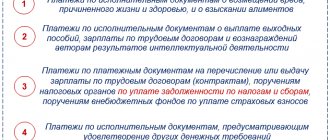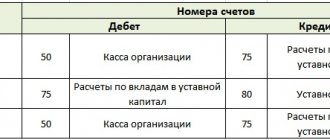Transit bank account - what is it?
If we consider the terminology, then this is an account in the currency of another state, which is used to transfer payment for a service or product.
Until 2007, every businessman who conducts business throughout the state gave away part of his profit: in different years this amount ranged from 10 to 50%, depending on legal requirements. To the great joy of entrepreneurs, this percentage is now 0%, thanks to such a banking profile.
This is interesting
To use a transit account, you need to pay a set commission fee and sell on the domestic market a set portion of the currency from the profit received at a fixed exchange rate. Also, one of the conditions for using a bank account is the transfer of part of foreign money into the domestic equivalent, according to the current exchange rate.
At the same time, this is not easy to do: in order to sell/exchange currency, the owner must write a special application, where it is necessary to indicate the amount of the transfer in banknotes. Amounts are redirected to cover losses. This is mandatory for legal entities when establishing business contacts with non-residents of the state. For convenience, insurance companies from other countries also use this method.
What is a foreign currency account: goals and features
A foreign currency account differs from a ruble account only in the type of funds that are planned to be stored. The practical benefit is obvious: you can pay in foreign currency in Russia or abroad and not lose money during conversion. The basic rules regarding the functioning of the account are stipulated in the Federal Law “On Currency Regulation”.
In particular, the number of banks capable of offering such a service is limited: to carry out activities related to banknotes of other countries, a special license from the Central Bank is required. Depending on the scope of rights and opportunities, there are:
- general license - the bank has the right to carry out transactions with banknotes of other countries, both on the territory of Russia and abroad;
- extended - limits the number of foreign correspondent banks to 6 units;
- one-time - allows for a specific transaction with foreign currency.
Before you finally choose a banking institution for further storage of funds, you should clarify the type of license, as well as its validity period.
Individuals, companies, individual entrepreneurs, according to the law, have the right to open foreign currency accounts. This will make it possible to carry out the following types of transactions with foreign currency:
- current - money transfers for export and import items, obtaining a loan (for up to six months), transfers for interest, dividends, as well as payment of pensions and wages;
- related to monetary transactions - investments (in securities, authorized capital of companies abroad), purchase or rental of real estate, obtaining loans for a period of 6 months or more, any other transactions with foreign currency funds.
After submitting the appropriate application for an individual or legal entity, the bank creates several accounts at once:
- transit - money coming from abroad ends up here;
- current (main) - for crediting funds remaining after the mandatory sale of part of the income;
- special - currency purchased from Russian banks is credited to it.
For legal entities, a foreign currency account expands the boundaries of doing business, and for ordinary citizens it provides a number of advantages over a ruble account:
- you can buy or sell goods and services directly without using exchange offices;
- transfers abroad (for example, to loved ones on vacation in other countries), payment for foreign education and tourist trips - no interest is lost when converting currencies, there is no need to resort to payment systems;
- no need to carry foreign currency in cash when traveling;
- Conveniently manage finances from your mobile phone through online banking.
What is it for?
So what is a transit bank account and what is it for? It is used so that fiscal (tax) authorities can control the activities of a businessman. It is also an “intermediate point” for currency exchange, according to the exchange rate: that is, first the money is transferred to the transit number, and then only from it to the regular one. This applies to both entrepreneurs and individuals.
It is used for transfers for the following services:
- Transportation of goods to another country;
- Insurance payments;
- Transfer of goods.
You may be subject to commission and administrative fees.
Do you want to start using the money that came to you? Confirm the reality of the transaction by performing identification. To do this, just bring the bank to the tax office:
- Certificate of currency transaction.
- A contract stating the reason for the transfer of finances.
The bank may charge a commission because it is a currency control agent whose services are not free. All tariffs are specified in the agreement for settlement and cash services.
The rules for using accounts are defined in the special instructions of the Central Bank under number 111-I, dated March 30, 2004. The main conditions for transactions with currency within the Russian Federation are regulated by Federal Law No. 173 “On Currency Regulation and Currency Control” (the law came into force on December 10, 2003). Any person who will conduct transactions with dollars or euros must know these rules.
Selling currency from a current account
As a rule, after funds are received in a transit account, companies wait for it to be transferred to the current account. After this, they can freely use the money and perform the necessary transactions. If the necessary documents are submitted to the bank in a timely manner, currency units will be unblocked on the day of their submission.
When crediting to a transit account occurs on the basis of a foreign trade agreement, the period will be extended until the documents are processed. If the company's purpose is to make a payment in foreign currency to a non-resident, then a special application will be required. Once submitted, the translation can be completed. At the same time, the company must remember to pay VAT.
Structure
Everyone knows that the legal currency of Russia is the ruble, but when export relations arise, it is allowed to use other banknotes. For convenience and data recording, intermediate accounts are used. A transit bank account is an example of an accumulating (savings) account, and a person will be able to dispose of the amount only 15 days after receipt.
It consists of the following elements (details):
- a unique number, usually consisting of 20 digits;
- BIC - banking institution code;
- the agreement on opening a transit currency account must contain your data - INN and KPP;
- correspondent bank number (also twenty-digit).
The number is often called a bank identifier, since each group of numbers defines encrypted information. So, the first three digits mean the number of group I. The second two are number II of group. The sixth, seventh and eighth digits determine the currency code. The ninth is the verification number. The next four digits determine which financial institution this account belongs to. The types of institutions are indicated by the next two numbers after them. The last five digits are an internal bank reference point by which the client is identified.
The procedure for confirming credits to the account
The currency account consists of the following areas:
- current currency account;
- transit currency account;
- special transit currency account.
Each of these areas performs its own functions at certain stages. The transit account is used to credit export proceeds in foreign currency. After the funds have been credited to the balance sheet, the banking organization notifies its client about this. However, often not all credit and financial companies send notifications to the client (
What is the difference between a current account and a transit account?
If we have already figured out why currency numbers are needed, then it is worth deciding on their characteristics and fundamental differences.
To do this, let's take a look at the table with a description:
| Characteristic | Calculated | Transit |
| 1. Purpose | Recording and accounting of performed transactions | Short-term savings of funds in foreign currency |
| 2. Shelf life | Limited by the duration of the contract | 15 days |
| 3. Applications | No restrictions | Used for: profit accumulation; payment of customs duties and duties; converting some part of the profit into foreign currency (10-50%); when paying for services for transporting goods across the border. |
| 4. Difference in account (digit in seventh position) | 0 | 1 |
| 5. Currency control | Not obligatory, as it usually accumulates amounts of money in national currency | Required |
What happens after exchange control?
If the situation ends well, the origin of the money is confirmed, then the transfer from the transit account to the main account occurs. Moreover, the transfer can take place both in the foreign currency in which the foreign currency account is opened, and to a ruble account (at the internal bank rate) - this decision is made by the company whose foreign currency funds are still in the transit account.
If the bank still has questions, it may request again some documents relating to the received money. Until the bank is satisfied that these funds have no problems with the justification for their receipt, it will continue to hold the money in the transit account.
Why do banks check the origin of funds so carefully? The whole point is that in this case, financial institutions are controllers, replacing the state. If the control is carried out incorrectly, in violation of the procedure or in a hurry, without the proper level of verification of all documents provided, the bank may face serious problems, including deprivation of its license.
What is money transit?
The word itself speaks of a certain movement, and in relation to monetary units it is the transfer of a certain amount of money from one account to another. To transfer amounts of funds from a transit number, for example, to pay a state fee, you, as the owner, must issue an order for this operation. This is not necessarily a written notification - the entire process can be carried out through the “Personal Account”. There you need to fill in the details - there are special input fields for them - and indicate the transfer amount, so you will confirm the operation.
Thus, you give permission to write off the specified amount. After this, the report will be available to you.
What is currency control from a legal point of view?
All companies that receive money transfers from abroad undergo currency control. During this control, the bank receives information from account owners (mainly legal entities) that the money was received legally. What documents should a company provide to the bank so that they do not have problems with the receipt of currency? The list is small, so there will be no difficulties with it:
- an agreement with a foreign buyer, which specifies the terms of payment (full or partial prepayment or payment upon delivery);
- invoices issued by the exporting company for payment for goods shipped or planned for shipment;
- specifications deciphering which goods are shipped and at what cost;
- acts of acceptance and transfer of goods, if the shipment has already taken place, the goods have reached the buyer and the documents have been returned.
In addition, the company must provide the bank with an order signed by an authorized person, which will contain information about the intention to transfer funds from the transit account to the current one.
The verification process sometimes takes more than one hour or even more than one day. It is not possible to transfer money directly to an organization’s foreign currency account, since in this case the money will automatically become the property of the account owner and can be used by him to the fullest extent, and this cannot be done until the origin of the funds is confirmed. But leaving money already transferred from a foreign financial institution in their accounts is also unacceptable. So banks create so-called transit accounts to temporarily store money on them.
What time period are we talking about? Ideally, everything happens in one business day, and then tomorrow the operation will be confirmed and the money will be transferred to the rightful owner. Well, what to do if the operation is refused? The bank has the right to require additional certificates. The law states that currency control should last no more than 15 days. This time is a priori sufficient to check all points of interest and draw a conclusion about the origin of funds.
This money is formally considered the money of the enterprise, and therefore it should be recorded in 1C as own funds stored in transit accounts and displayed in rubles at the appropriate rate.
Regulatory framework for foreign exchange transactions of enterprises
The development of legislation on the regulation of foreign exchange transactions was initiated by Decree No. 213 of November 19, 1991, which laid the foundations for the liberalization of foreign economic relations between Russia and foreign countries. Later, in October 1992, the Federal Law “On Currency Regulation and Currency Control” was adopted. He defined the rules of the “game” not only in the foreign exchange market, but in the activities of international enterprises and companies, and also indicated the functions and role of regulatory services.
The law stipulates that payment for goods or services by non-residents must be made within 30 days. The regulation also provides for the provision of information about the recipient and sender of funds, as well as the details of the transfer being carried out.
The regulatory document states that domestic organizations can open a foreign currency account only if they have permission to do so from the Central Bank of the Russian Federation. At the same time, it is the Central Bank that considers whether it is necessary to open an additional account for a business entity in one of the foreign banks, because in this case it must provide a report on the flow of funds at certain periods.
How do you receive funds into a foreign currency account in a Russian bank?
After a resident of the Russian Federation receives payment for goods, services rendered or work under an agreement, act or other official document, foreign exchange earnings are generated. To transfer and legalize it, you should open a special bank account (current, transit and special transit).
Next, the algorithm of actions is as follows:
- a notification is sent to the Federal Tax Service about opening an account - if the deadline for filing a notification is violated, the law provides for fines of up to 5,000 rubles;
- each separate account requires a separate notice;
- You should also report the accounts of branches (for legal entities);
- a package of documents is submitted to the bank to legalize the amount received (usually a contract and its copy certified by a notary are sufficient);
- if the transaction amount is more than $50,000, the bank issues a transaction passport (TS).
There are several reasons why a bank refuses to formalize a transaction agreement and, therefore, to recognize foreign currency earnings as legal:
- discrepancies in information in the contract (agreement) and the PS;
- failure to comply with legal requirements regarding permitted foreign exchange transactions;
- incorrect registration of the PS;
- the absence in the contract (agreement) of a clause stipulating the fact of receipt of funds to the account;
- lack of certified translation of contract documentation.
For each owner of a foreign currency account, after registration of the PS, a so-called resident dossier is compiled, which records all transactions on funds crossing the border in one direction or another.
For law firms, the dossier contains the following documents:
- transaction passport (in original);
- notarized copies of the contract;
- product registration cards;
- a copy of the customs declaration for the cargo certified by a notary;
- other documents related to the export or import of products.
You can find out a detailed list of required documents in the help desk of a particular bank.
How to open a transit currency account
For organizations that are involved in export or import operations, or are in partnership with non-resident firms, opening a foreign exchange office is a prerequisite.
List of documentation:
- a completed form where the client automatically gives his consent to the creation and activation of the number;
- a notarized copy of the statutory documents of the enterprise or company;
- card with a corporate stamp imprint and sample signatures;
- a decision with a notary’s seal on the foundation (legal registration of the legality of work in the business sector) of a business entity.
You must fill out an application in which you indicate that you need to conduct transactions in foreign currency. In addition to the application, you must show additional extracts and certificates that determine the status of the person (the company’s statutory documents).
note
Important information: upon activation, the account is immediately opened to convert profits into national currency.
Once you have prepared a list of documents for opening, you need to take care of the evidence that the currency that comes in has legal sources of origin. The bank will also have to make sure that your enterprise (firm) has qualified personnel to carry out financial transactions required by the practice of using currency and transit accounts.
After this, after some time, the financial institution will evaluate the prospects and make a “verdict”. Please note that the above list of documents is not final: the bank may change it by adding or deleting items, depending on internal policies and other factors.
How to close a transit account
As stated earlier, it opens along with the main one and is needed to identify the currency that is received by the client. Money is not stored on it 24/7 - in the future it can be transferred to a regular card. You can close it in the same way as a bank account.
After a business entity no longer needs to use this account, he needs to close it. This happens after filing:
- applications for closing, according to the form;
- amounts on the balance sheet.
According to the norms of Russian laws, an agreement between an entrepreneur and a banking institution can be terminated if there is mutual agreement or an objective requirement of one of the parties. Closing is considered valid from the moment the client or his authorized representative submits a special application for termination of the contract.
The rest of the money can be received immediately in cash or in the form of a transfer. After completing the closing procedure, you must notify the tax service about this as soon as possible (for late notification you will receive a fine of 1,000 rubles or more). To avoid problems, you must write about the closure within 7 business days. The main thing is to warn them about your plans in time.








